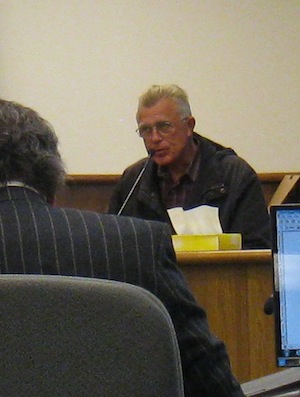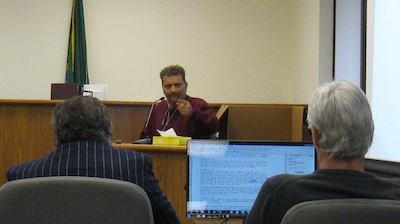
Ralph Vickers testifies about getting all $100 bills from Robin Riffe when he sold her two ounces of cocaine in 1985.
By Sharyn L. Decker
Lewis County Sirens news reporter
CHEHALIS – Former drug dealers have been called to the witness stand as prosecutors attempt to show the Riffes came in to money in December of 1985, when Ed and Minnie Maurin were found shot to death after withdrawing $8,500 from their Chehalis bank.
Yesterday in Lewis County Superior Court, Ralph Vickers spoke of what he told a detective when he was visited in 1991 in federal prison in Oregon.
Vickers said he recalled selling cocaine to Robin Riffe twice.
Robin Riffe, now deceased, was married to Ricky A. Riffe, who is on trial for the abduction, robbery and murder of the elderly Ethel couple. He and his younger brother John Gregory Riffe became suspects in the early 1990s but he was arrested just last year, shortly after his brother died.
Vickers said he lived in the Yakima area and knew Robin because his brother dated her for a time.
He’s now a car salesman, but ended up serving eight years in prison, he said.
He called himself a wholesaler who had perhaps 10 to 20 people to whom he sold large quantities of cocaine, such as a half kilo or a kilo at a time, he testified.
He recalled meeting his brother and Robin at Longacres racetrack and selling her a half ounce one time. The next time he saw her was at White Pass when he sold her two ounces, he said.
“I think she’d been away from my brother for quite some time,” he said. “I know she’d lost a lot of weight.”
She was with a man he’d never seen before and didn’t think he would recognize if he saw him again, according to Vickers.
Vickers was about 35 at the time, and he recalled being paid with 22 $100 bills, he said. He remembered it crossing his mind that could be something undercover cops might use, he said.
When he met with detectives in prison in 1991, according to his statement, he recalled a white car, but didn’t know what model or make, he said.
Earlier this week, prosecutors questioned another person who admitted to dealing drugs back in the mid-1980s.
Dora Flynn took the witness stand on Monday and told of mainly selling marijuana back then, but also cocaine and meth, which she admitted she also used.
She knew Robin, but knew Ricky Riffe better, according to Flynn.
Flynn recalled a time when she bought a chain necklace from Robin, because, she thought, they needed money for their light bill.
It was early in 1986 when Robin tried to buy a pound of marijuana from her, she said. It would have cost around $2,500, according to Flynn.
“No, I didn’t go through with it, because I didn’t really know Robin that well,” Flynn said.
With prodding from Lewis County Prosecutor Jonathan Meyer, Flynn indicated she was also reluctant because she also wondered if the money came from the Maurins.
Asked if she ever saw a white car at the Riffe’s house, she said one time, she thought a Chevrolet.

 Join us
Join us
Guest column: Suspension for arrested deputy explained
October 30th, 2013By Steve Mansfield
Lewis County sheriff
Recently, one of my employees, while off duty, was arrested for driving under the influence. The occurrence has received significant media and public attention.
The circumstances in this event fortunately involved neither property damage nor injury to others.
Lewis County Sheriff Steve Mansfield
Had it involved a common citizen, it likely would have received only minimal media attention if any at all. However, since it involved an off-duty officer who is sworn and empowered to enforce and uphold the laws of this state, including DUI’s, it was considered news-worthy, and a topic of discussion in our community.
This is a legitimate interest which I do not dispute. I even had some inmates I was supervising on a work crew over the weekend inquire about the situation. One even claimed to have been arrested by this employee for DUI.
Many of the comments and inquiries center on whether the employee will face the same penalties and accountability an ordinary citizen arrested for DUI would, or will he be treated differently because of his law enforcement status.
Just to be perfectly clear, the employee will receive no preferential treatment under the law nor any leniency in meeting legal requirements than what would be afforded to any other citizen arrested for DUI.
What may likely be very different from what most citizens would experience in their employment are the administrative sanctions imposed by my office.
Years ago when I first became a deputy, an incident like this would end a career with few questions asked. Today’s labor laws and union contracts afford greater protection to employees by ensuring due process is followed and discipline is only imposed in accordance with the principles of just cause.
Labor contracts also have grievance provisions that can ultimately take final disciplinary decisions out of the hands of management and put them into the hands of the Civil Service Commission, arbitrators, or superior court judges.
I typically refrain from voluntarily disclosing details of disciplinary action taken within my office, but I feel the circumstances of this case warrant such disclosure.
In looking at the totality of this situation and the employee’s exemplary performance over the past 12 years, the administrative sanctions imposed included a two week unpaid suspension from duty, removal from his current position as detective and a last chance agreement that ties his continued employment directly to the conditions imposed by the court.
I believe many of the problems we deal with today exist in part, because we have lost so much of the social accountability that we once had in the past. This is not just accountability that emerges from media attention, but more importantly accountability that originates in and is enforced by our families, friends, schools, churches and organizations to which we belong.
Regardless of one’s profession, religion, sex or race, we are all human, and we are all susceptible to making mistakes and bad choices. When alcohol is involved, it seems mistakes and bad choices are all too often the end result.
Despite our intense focus on education and enforcement, DUI still continues to destroy families, careers and compromises safety and security within our communities.
As a society, we hold those who break the law accountable for their actions.
You as citizens naturally and rightly expect and demand those of us who are sworn to protect and enforce the law, to obey those laws and be held just as accountable for our actions.
That social expectation is extremely influential in motivating us to achieve our mission, uphold our oath of office and code of ethics, and to protect and serve you in a manner that fosters trust, is responsible, respectful, fair and caring.
My employee made an extremely poor, unacceptable decision when he chose to drink, get behind the wheel of his vehicle, and drive down the roadway. It is a decision over which he is extremely embarrassed and sincerely regrets.
He is now being held accountable for that mistake.
It is my hope this employee turns the negative of this experience into something positive and constructive that ultimately leads to him being a better employee, a better citizen, and a father his family can look up to.
He has recommitted himself to me that he will fulfill our mission and uphold his oath of office and code of ethics as he carries out his duties and responsibilities in serving you, the citizens of this county.
Not everyone earns, deserves, or is afforded a second chance. It is my expectation, not only as your sheriff, but also as a citizen, that he earns and proves himself worthy of this opportunity.
•••
For background, read “Lewis County sheriff’s deputy pleads not guilty to DUI” from Friday September 13, 2013, here
Posted in Columns and commentary | 28 Comments »